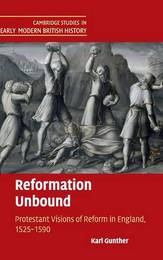
|
Reformation Unbound: Protestant Visions of Reform in England, 1525-1590
Hardback
Main Details
Description
Fundamentally revising our understanding of the nature and intellectual contours of early English Protestantism, Karl Gunther argues that sixteenth-century English evangelicals were calling for reforms and envisioning godly life in ways that were far more radical than have hitherto been appreciated. Typically such ideas have been seen as later historical developments, associated especially with radical Puritanism, but Gunther's work draws attention to their development in the earliest decades of the English Reformation. Along the way, the book offers new interpretations of central episodes in this period of England's history, such as the 'Troubles at Frankfurt' under Mary and the Elizabethan vestments controversy. By shedding new light on early English Protestantism, the book ultimately casts the later development of Puritanism in a new light, enabling us to re-situate it in a history of radical Protestant thought that reaches back to the beginnings of the English Reformation itself.
Author Biography
Karl Gunther is an Assistant Professor of History at the University of Miami. His research focuses on the history of the English Reformation and the religious and intellectual history of Reformation Europe more broadly. Before coming to the University of Miami, Gunther taught in the Department of History at Rice University, Houston. He has been the recipient of numerous fellowships and grants, including from the Folger Shakespeare Library, and has published articles in Past and Present, The Journal of Ecclesiastical History, and History Compass. This is his first book. He currently serves as the Vice-President of the Southern Conference on British Studies.
Reviews'A much needed corrective to earlier interpretations of the English Reformation and a major contribution of early modern intellectual history. If radicalism sits at the heart of religious reform, then this forces scholars to reassess the nature of religious debate and the origins of English puritanism. Scholars in Renaissance studies, Christian theology, and political theory will find this book an invaluable resource.' Christopher Petrakos, Anglican and Episcopal History
|